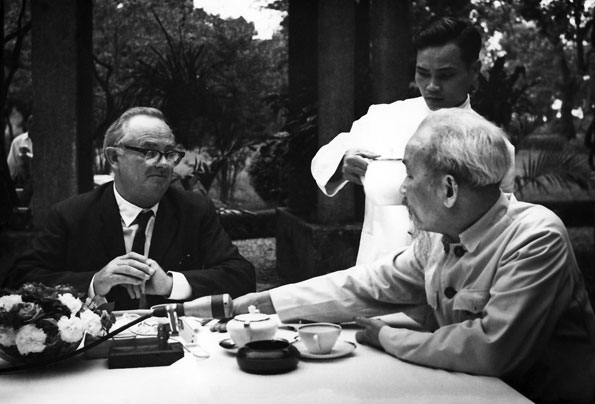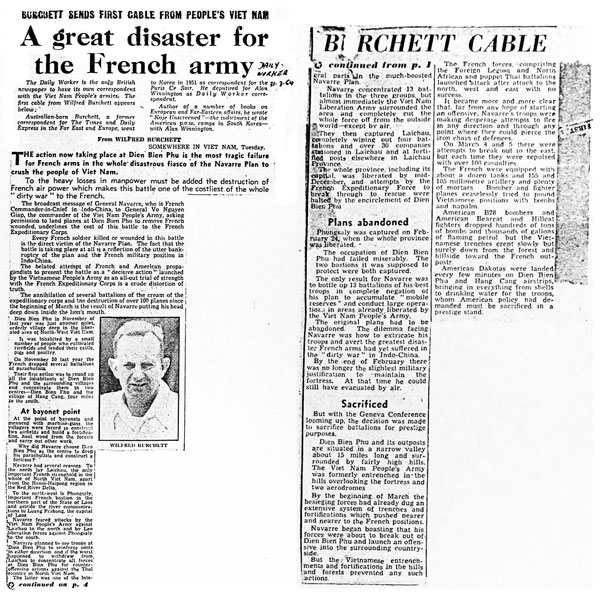
A legendary journalist’s account of his meeting with President Ho Chi Minh about the battle that ended French colonialism.
from Wilfred Burchett, North of the 17th Parallel, 1955
PEOPLE'S INFORMATION BUREAU (PIB) • FROM YEN PHU REPUBLIC
VN Express
With the minute attention to detail that I found later was so characteristic of this great leader of the Vietnamese people, he had called shortly after my arrival with another journalist, to assure himself that we had survived the rigours of the journey and were in good health. It was difficult to believe that within a few hours of arrival we should be sitting opposite this legendary revolutionary leader. But there he was, the unmistakably kindly face, the twinkling depthless black eyes, the thin straggling beard, the face we had known from photographs and portraits for years past. He had appeared out of the jungle shadows unannounced, a windbreaker jacket thrown cape-like across his shoulders, walking briskly with a long bamboo stick, sun-helmet worn high over his broad brow. After he had put us completely at our ease in his fluent French and English – and had addressed a few words in Italian to my Italian colleague – we asked President Ho why the radio was making such a noise about Dien Bien Phu. What in fact was going on there?
"This is Dien Bien Phu," he said and tipped his sun-helmet upside down on the table. "Here are mountains," and his slim, strong fingers traced the outside rim of the helmet, "and that's where we are too."
"Down here," and his fist plunged to the bottom of the helmet, "is the valley of Dien Bien Phu. There – are the French. They can't get out. It may take a long time, but they can't get out," he repeated. That was the battle of Dien Bien Phu in a sun helmet. It was the picture which remained before my eyes for the weeks that followed, listening to the radio on the long train ride back to Peking, all the way across the Trans-Siberian railway to Moscow and during that first week at the Geneva Conference when the ebb and flow of battle was dramatized by western news agencies with their highly colored and distorted accounts of French victories and break-outs.
In the bowl of President Ho's sun helmet were the best troops the French High Command could muster in lndo-China, gradually to be built up to over 16,000, two-thirds of all the specially trained mobile forces in North Vietnam and by the end of the battle all their trained – and many untrained – parachute troops.
A few minutes after President Ho had so succinctly presented the Dien Bien Phu picture, the sun helmet was brought into play again when in a few words and with a few brief gestures, he related how guerilla fighters in coordination with the Dien Bien Phu action had penetrated into the French air base of Gia Lam at Hanoi and Cat Bi at Hai Phong to destroy a total of 78 planes on the ground – 60 of them at Cat Bi.
"Cat Bi is a heavily guarded peninsula," explained President Ho and again the sun helmet was upside down, its oval rim the 20 kilometers long perimeter of Cat Bi with the sensitive brown fingers tracing the series of barbed wire fences which surrounded the field, pausing to stab into place artillery and anti-aircraft positions, machine-gun nests, searchlights and all the other obstacles the guerilla fighters had to overcome to carry out their extraordinary exploit. One had the feeling from his intimate knowledge of the defenses of the aerodrome that the president himself had something to do with mapping out the attack.
But he had not come to discuss military affairs with us. After assuring himself that we were comfortably installed and had really survived the journey in good shape, he threw his wind-breaker over his shoulders again, put on his sun helmet and with his bamboo stick and a single soldier for protection, moved off into the deepening jungle shadows. As he left, he turned and said, "You can tell the comrades over there," waving in the general direction of Europe with his stick, "that I am in good health. I can still walk 40 kilometers a day as long as there's not too much of this..." and he waved his stick up and down to indicate the high mountains which surrounded us. With a final wave, he was swallowed up by the jungle.
The first impression of this meeting with the leader of the Vietnam people was the complete informality, the warmth and simplicity of it all. President Ho – or Uncle Ho as he is to millions of people throughout lndo-China – had the ability to make one feel at ease from the first moment and to present the most complex questions in a few clear words and gestures. In subsequent meetings with this great personality it is just those qualities of warmth, simplicity and the clarity of expression which only comes with exceptional intelligence and complete grasp of the subject – which made the deepest impression. Everyone who is received by President Ho comments on these characteristics, and above all their feeling of being immediately "at home" with him.
Editor's note: Vietnam marks the 65th anniversary of the Dien Bien Phu battle on Tuesday. Spellings used in the original article have been retained.
Closing words
Like vampires fearing light, capitalists elites have always been afraid of the socialist demonstration effect. A huge and constant effort is aimed at "showing" that socialism doesn't work, that it is tyrannical, inefficient, etc. Thus sabotaging and killing socialism wherever it may arise —Russia, China, Korea, Venezuela, Chile—by any means necessary, no matter how brutal and dishonest, is therefore standing policy. But socialist solutions work. And Medicare for All would show everyone in America, the key capitalist fortress, that many of our nightmares can easily vanish under socialism. For the capitalists and their hanger-ons it would be a Pandora's box.—P. Greanville
The best way to get around the internet censors and make sure you see the stuff we publish is to subscribe to the mailing list for our website, which will get you an email notification for everything we publish.

THIS WORK IS LICENSED UNDER A Creative Commons Attribution-NonCommercial 4.0 International License
Be sure to get the most unique history of the Russo-American conflict now spanning almost a century! The book that every American should read.
 Nuclear Armageddon or peace? That is the question.
Nuclear Armageddon or peace? That is the question.
And here’s the book that answers it.
How did we come to be in this horrid pickle? Join the discussion! Read Ron Ridenour’s provocative bestseller The Russian Peace Threat, the most scathing and irrefutable exposé of US foreign policy and its malignant obsession with the elimination of Russia as a countervailing force in world affairs. Buy it today direct from us. You don’t have to patronize Amazon. Just click on the bar below.
.CLICK HERE to buy The Russian Peace Threat.









